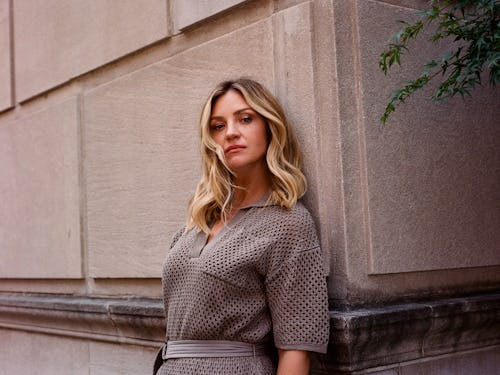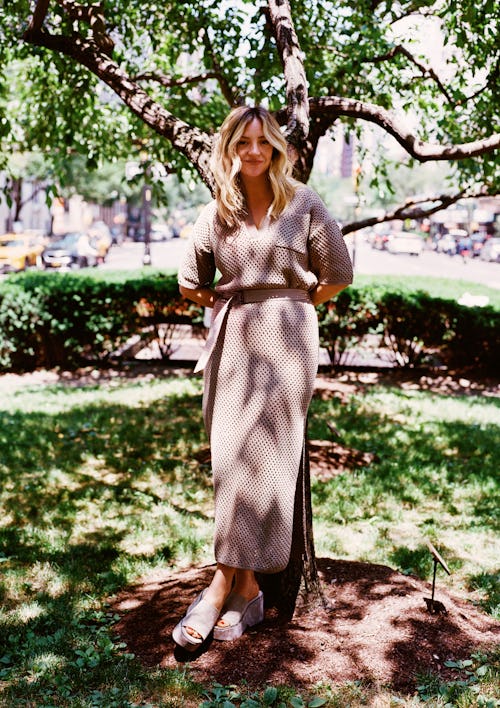
Abby Elliott has not tried the omelet. You know the one. In Season 2 of The Bear, we watch Sydney (Ayo Edebiri) painstakingly prepare a boursin cheese omelet for Elliott’s character Natalie, who’s near to the point of collapse from the combined stress of the restaurant opening and her own pregnancy. We see Sydney delicately strain the eggs, fold in the cheese, and then, in the scene’s most mouthwatering and catchy moment, she crumbles a handful of potato chips on the finished product. It’s a beatific gesture of care and patience in a season that’s largely about how hard it is to hold onto such gestures in the midst of the chaos of work and family and social life. I know I’m not the only fan of the show who started crushing chips on their own eggs afterward.
But not Nat. Elliott, 37, who plays the sister of Jeremy Allen White's "Carmy" in the Emmy-nominated series, could barely handle eating the omelet on the day of filming. Elliott was pregnant with her second baby when they shot the second season. “I didn’t have morning sickness,” she told me, “but I had an aversion to eggs, and in that scene I had to use a spit bucket.”
Elliott’s experience of The Bear, at least over the past two seasons, has been full of similarly uncanny back-and-forths between her character’s life on screen and her own life. The show’s producers wrote Nat’s pregnancy into the show after Elliott filled them in — “I was really nervous to tell everybody because I'd never been in that situation before. I told them I think at 10 weeks, and obviously, they were just so kind and thrilled for me, and I think it really worked for Natalie, for the character.”

While Season 2 found Elliott performing her own pregnancy in front of the cameras, Season 3, which shot several months after she gave birth, found Elliott strapping on a baby bump and having to go back and re-inhabit a physical and emotional experience she’d only just recently gone through.
During the second season, Nat’s pregnancy became not just incidental, but structural to the show. The writing team incorporated details from Elliott’s own experience, but also focused on the dual role the character takes as both an anxious expectant mother and the anxious caretaker of The Bear, yet another project that needs her in order to come to fruition. “That's who Natalie is,” she told me. “She's so hesitant and so scared to say out loud that she's pregnant at the same time that she's so hesitant and scared to say out loud that she's going to help out with the restaurant. I think that they're intertwined in a way.” It’s not just, then, that The Bear uses its many mothers — absent and present — to figure its interest in the family; The Bear understands motherhood itself as labor, just like working in the kitchen, just like working on yourself.
Everything the show has to say has been routed through mothers. And Natalie has gradually become the center of that focus.
The Bear has always been a show about moms. Sure, it’s a show about haute cuisine, about class, about legacies of trauma, about grief, about Chicago, about education, about ambition, about the very idea of creative genius, about perfect white T-shirts and Thom Browne, about family, born and chosen. But underneath all of this, the show has long been built atop a pervasive fascination with mothers and motherhood. If this is a show about family, what that often means, on screen, is that it’s about mothers, monstrous or lost. In the background of every Sydney story is that she grew up without her mother, Marcus’ arc from the beginning of the second season through to Season 3 is his mother’s long illness and eventual passing, Tina’s brilliant standalone episode “Napkins” this season goes out of its way to frame her as a working mother, and, of course, the supernova of matriarch Donna Berzatto in Season 2’s “Fishes” cast a roasting light on everything before it in the show and much that has transpired after. Everything the show has to say about that aforementioned list of ideas — from food to trauma and back again — has been routed through mothers. And Natalie has gradually become the center of that focus.


All of this comes together late in the season in “Ice Chips,” this season’s standout, standalone episode about Natalie’s labor and her fraught relationship with her mom Donna (Jamie Lee Curtis). In the episode, Nat goes into labor just as all of her most trusted friends and family have locked down their phones for service at the restaurant, and so Nat is left to call her semi-estranged mom. What transpires is, in some ways, exactly what Nat expected — a blustering, bullshitting mother making the whole thing about her — and, in other ways, exactly what she needed.
To prepare for the episode, Elliott went back and rewatched video footage of her recent real-life labor, shot by her own — considerably more supportive — mother. “Getting back into the feeling of being pregnant and the hormones,” she told me, “that was a huge thing for me. Trying to accurately depict the contractions and the pain of those and just how deep in the gut it is. And I had a lot of videos from my birth that my mother took and an actual video of my son coming out, which no one ever needs to see, but I watched everything.”
“Ice Chips” stays close to its two mothers, telling its story through their, yes, punchy dialogue, but more than that, through the tiny dramas that play out in the way they look at each other, and breathe with each other.
For all the attention that The Bear’s big, shouty dramatic episodes have drawn, what has always anchored the show is its attentiveness to the detail of its characters’ lives. “Ice Chips” stays close to its two mothers, telling its story through their, yes, punchy dialogue, but more than that, through the tiny dramas that play out in the way they look at each other, and breathe with each other. And for all the justified attention paid to Jamie Lee Curtis’ gargantuan performance, it’s Abby Elliott who makes it real.
“Ice Chips” is a fascinatingly unorthodox entry into the sub-genre of the labor and delivery episode, at least by TV standards. We normally expect a lot of shouting, a lot of cursing, an army of wise and attentive nurses, the steady hand of the family doctor, and, of course, the delivery of a perfectly clean 7- to 8-month-old baby. There’s plenty of shouting and cursing in “Ice Chips,” just like in the rest of the series, just not the kind you’d ordinarily associate with the standard cathartic TV birth. Instead, the episode is imbued with more nuanced, less frequently-represented horrors of labor and delivery.

In “Ice Chips,” for instance, the nurses are detached and occasionally curt. The doctor is shown, not as a lovable familiar, but as an overburdened steward, distracted by the dozens of other women he’s attending to at the same time. (Delivering her baby with a doctor she didn’t know was a detail inspired by her first delivery.) Before filming, Elliott talked with the co-showrunner, producer, and director Joanna Calo, who has two kids and wrote the episode. “We talked about our birth experiences and how uncomfortable and scary it is the first time in the hospital,” Elliott said.
And then there’s the pain. “One thing that I hadn't anticipated was the cervical checks. With my first, I was asking for pain medication for the cervical checks.” The brief jarring moment when Nat has a cervical check is underplayed on screen, but it’s instantly recognizable to anyone who is familiar with the dynamic. “That was really just something that I was thinking about that was on my mind, just how uncomfortable that is, how foreign it feels, and how you just don't expect it. And just also how nonchalant it is for doctors to say these things, that they do it every day, it is comfortable for them, it's normal, and just how scary it is when you don't know what anything means.”
“The labor is the reason why they're together, but showing them together is really what the episode is about.”
And so, in this clinical environment, designed to deliver babies rather than care for mothers, Nat turns to Donna, the best of bad options. “The labor is the reason why they're together,” Elliott says, “but showing them together is really what the episode is about.” The physical pain of being in labor juxtaposed with the equally physical pain of, as Elliott puts it, rehashing the trauma.
This is something every character experiences in this season in some way or another, the phenomenon of desperately needing something from someone else but being unable, ultimately, to find it. In the end, Donna comes through for Nat. Even as she blusters and bullshits and makes it about herself, she gives her daughter what she needs. Elliott told me that, on the show, “motherhood is about a lot of imperfections, a lot of trying and failing and trying and succeeding and hope.” It’s no coincidence that that’s a pretty good description of what The Bear’s about, too.
Phillip Maciak is the TV critic at The New Republic and the author of Avidly Reads Screen Time. He teaches at Washington University in St. Louis.
Photographs by Kat Slootsky
Talent Bookings: Special Projects
Photo Director: Alex Pollack
Editor in Chief: Kate Auletta
SVP Fashion: Tiffany Reid
SVP Creative: Karen Hibbert
0 comments:
Post a Comment